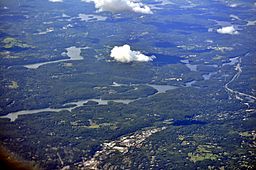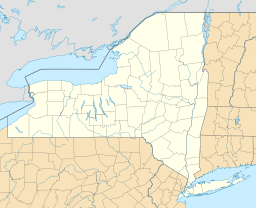Muscoot Reservoir facts for kids
Quick facts for kids Muscoot Reservoir |
|
|---|---|

Muscoot Reservoir cuts across this 2013 aerial photograph from lower left to center and upper right. At center left is Amawalk Reservoir (which drains into Muscoot Reservoir) at upper right is Lake Mahopac. Mount Kisco, New York is at bottom center and near center right are Katonah, New York and Interstate 684.
|
|
| Location | Westchester County, New York |
| Coordinates | 41°16′10″N 73°42′25″W / 41.2694°N 73.7070°W |
| Type | reservoir |
| Catchment area | 76 sq mi (200 km2) |
| Basin countries | United States |
| Surface area | 1,263 acres (511 ha) |
| Max. depth | 30 ft (9.1 m) |
| Shore length1 | 30.5 mi (49.1 km) |
| Surface elevation | 200 ft (61 m) |
| 1 Shore length is not a well-defined measure. | |
The Muscoot Reservoir is a large reservoir located in northern Westchester County, New York. It's a key part of the New York City water supply system. You can find it just north of Katonah.
This reservoir is part of the Croton Watershed, which helps provide drinking water to New York City. It's about 25 miles (40 kilometers) north of the city. The reservoir was created in the early 1900s. Workers built a dam to hold back the Muscoot River. This river is a branch of the Croton River, which then flows into the Hudson River.
Contents
Muscoot Reservoir: A Water Wonder
The Muscoot Reservoir wasn't always this big. Originally, it was much smaller. To make it larger, engineers intentionally flooded the area behind the first dam. They built a new, bigger dam further downstream. The old dam is still there today. It actually divides the reservoir into two parts.
The Historic Railroad Bridge
During the reservoir's construction, something special happened. The New York Central Railroad moved a bridge called Bridge L-158. It was moved from a place called Rondout Creek near Kingston. This bridge was then used to carry the Mahopac Branch across a part of the reservoir. This section is near Goldens Bridge.
Even though train service on that line stopped in 1960, the bridge is still standing. In 1978, it was recognized as a historic place. It's the only remaining double-intersection Whipple truss railroad bridge in New York state.
Supplying Water to New York City
The Muscoot Reservoir was finished in 1905. It acts as a main collection point for water from most other reservoirs in the Croton Watershed. Only the New Croton Reservoir gets its water later.
This reservoir is almost 8 miles (about 13 kilometers) long. It can hold a huge amount of water. At full capacity, it holds up to 4.9 billion US gallons (18.5 million cubic meters) of water. The area that drains into the reservoir, called its drainage basin, is 76 square miles (121.6 square kilometers).
Water from the Muscoot Reservoir flows into the rest of the Muscoot River. Then, it joins the Croton River. From there, it flows into the New Croton Reservoir. After that, the water enters the New Croton Aqueduct. This aqueduct carries the water south to the Jerome Park Reservoir in The Bronx. It continues to Manhattan, where it mixes with water from another aqueduct. Finally, it reaches Brooklyn and ends in Staten Island.
Fish Friends in the Reservoir
The Muscoot Reservoir is home to many different kinds of fish. If you were to go fishing there, you might find:
 | Roy Wilkins |
 | John Lewis |
 | Linda Carol Brown |


